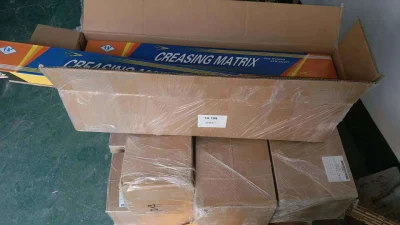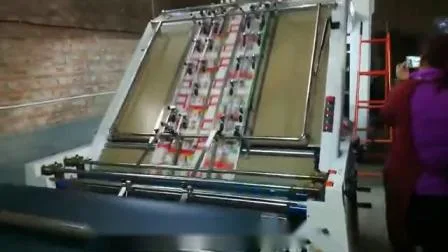
Plastic Creasing Channel Matrix for Die Cutting
Basic Info
| Model NO. | 0.3*0.8-1.0*6.0 |
| HS Code | 39169090 |
| Production Capacity | 200 Box/Boxes Per Week |
Product Description
Die Making Creasing Matrixs for Die cutting and creasing machine
1. For die cutting . 2. Different size available. 3. Two different material :plastic and pressboard
Adhesive Creasing Matrix
Specifications:
Material: plastic,Pressboard.
Size:0.2*1.0mm,0.3*0.6mm,0.3*0.8mm,0.3*1.0mm,
0.3*1.1-1.7mm,0.4*0.6mm,0.4*0.8mm,
0.4*1.0-1.7mm,0.4*1.9mm,0.4*2.1mm,
0.5*0.6mm,0.5*0.8mm,0.5*1.0-1.7mm,and etc.
Advantages:
1)Fast and exact matrix
2)Self adhesive steel based
3)Channel from hard plastic
Accurate positon ability, good glue material to ensure sticky ability
Complete range of size to ensure all kind of demand
Plastic material and pressboard material both available
Ordinary type and Finger lift type (for easy peel off the back)
Back width: normal 13mm or narrow 9mm
Length: 700mm/pcs
Technique characteristics:
Brank quickly setting cteasing matrix, adopting advanced technology, and well making, is the rsult of years of technical innovation and practical application, enjoying a high reputation in the carton and box industry. Convenient handing and excellent quality make the creasing perfect..
A.Thickess of creasing matrix.B.Brute mighty bottom filmC.Channel width of creasing matrix.D.Locating plastic strip.E.Protection film.
| 1.The amount needed to get the length of the indentation modulus | 2.Indentation die cutting machine used incision, the indentation die cut into both ends of the natural 90-degree corner |
| 3.Indentation with plastic mold on the position will be cut indentation in the card-mode version of the cutting line indentation | 4.To protect Indentation model glue off the bottom |
| 5.Die-cutting machine to transfer the pressure well, and then die-board installed, and then switch on a cutting machine, that is, positioning mode indentation in the mold plate on the end of | 6.Indentation modulus tear on the positioning of plastic article |
| Paper weight (g) | Thickness of the paper | Indentation line height (mm) | Indentation made common line | ||||||
| 23.50 | 23.40 | 23.20 | 23.20 | 23.10 | 23.00 | 23.24 | 22.9 | ||
| 200 | 0.28mm | 0.3×1.0 | 0.4×1.0 | 0.5×1.0 | |||||
| 250 | 0.35mm | 0.3×1.2 | 0.4×1.2 | 0.5×1.2 | 0.5×1.2 | ||||
| 300 | 0.42mm | 0.3×1.3 | 0.4×1.3 | 0.5×1.4 | 0.5×1.4 | ||||
| 350 | 0.50mm | 0.4×1.4 | 0.5×1.5 | 0.6×1.5 | 0.5×1.5 | ||||
| 400 | 0.56mm | 0.5×1.6 | 0.6×1.6 | 0.5×1.6 | 0.8×1.6 | ||||
| 450 | 0.63mm | 0.5×1.7 | 0.6×1.7 | 0.7×1.7 | 0.8×1.7 | ||||
| 500 | 0.70mm | 0.7×1.7 | 0.8×1.7 | 0.8×1.7 | |||||
| Note: Specifications recommended only choice, as the first choice Specifications | |||||||||
Corrugated selected in the control (by beer-cutting knife to do a high standard 23.8mm)
| corrugated paper | after flattened corrugated thickness | the height of the creasing line | the choosable creasing mould(1.05 thickness creasing line) | the choosable creasing mould(1.42 thickness creasing line) |
| E-Flute | 0.65mm | 23.10mm | 0.7*2.3 | ---- |
| E-Flute | 0.75mm | 23.00mm | 0.8*2.5 | ---- |
| B-Flute | 0.85mm | 22.90mm | 0.8*2.7 | 0.8*3.2 |
| C-Flute | 0.95mm | 22.80mm | 1.0*3.0 | 1.0*3.5 |
| C-Flute | 1.05mm | 22.70mm | 1.0*3.2 | 1.0*3.5 |
| 1.15mm | 22.60mm | ---- | 1.0*4.0 | |




